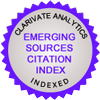
Current challenges and future outlooks of pipeline structural health monitoring: A Review
Hussein A M Hussein1, Sharafiz B Abdul Rahim1, Faizal B Mustapha2, Prajindra Sankar Krishnan31Mechanical And Manufacturing Engineering, Universiti Putra Malaysia (upm), Serdang, Malaysia2Aerospace Engineering, Universiti Putra Malaysia (upm), Serdang, Malaysia
3Electrical And Electronics Engineering, Universiti Tenaga Nasional (uniten), Kajang, Malaysia
This paper presents a comprehensive literature review on data-driven structural health monitoring (SHM) approaches for pipelines. The review explores the common failure modes, driving signals, sensor technologies, and the application of artificial intelligence (AI) and machine learning (ML) techniques in pipeline SHM. The analysis of a significant number of publications reveals that corrosion, erosion, cracks, and deformation are among the most prevalent failure modes, while a diverse range of driving signals, including time series data, vibration, temperature, and acoustic emissions, have been utilized for monitoring. The review also highlights the growing prominence of sensor technologies, such as optical fiber sensors, ultrasound techniques, and piezoelectric sensors. The application of AI and ML techniques, including supervised learning models, deep learning, and ensemble methods, has demonstrated significant potential in enhancing pipeline SHM capabilities, enabling accurate anomaly detection, failure prediction, and optimization of maintenance strategies. Furthermore, the review identifies the emergence of promising technologies, such as energy harvesting, the Internet of Things (IoT), robotics, and drones, which offer innovative solutions to address the challenges in pipeline SHM. The review concludes by discussing key challenges, providing recommendations, and outlining future outlooks to guide the advancement of pipeline SHM through collaborative efforts, industry standards, and continued research and development, and to assist researchers, novice students, and practitioners to focus their work on worthy research points in order to avoid repetitions and to present beneficial novel studies.
Keywords: Structural Health Monitoring (SHM), Pipeline anomalies, Data-Driven systems, Artificial Intelligence (AI), Machine Learning (ML), Ensemble Learning
Makale Dili: İngilizce



